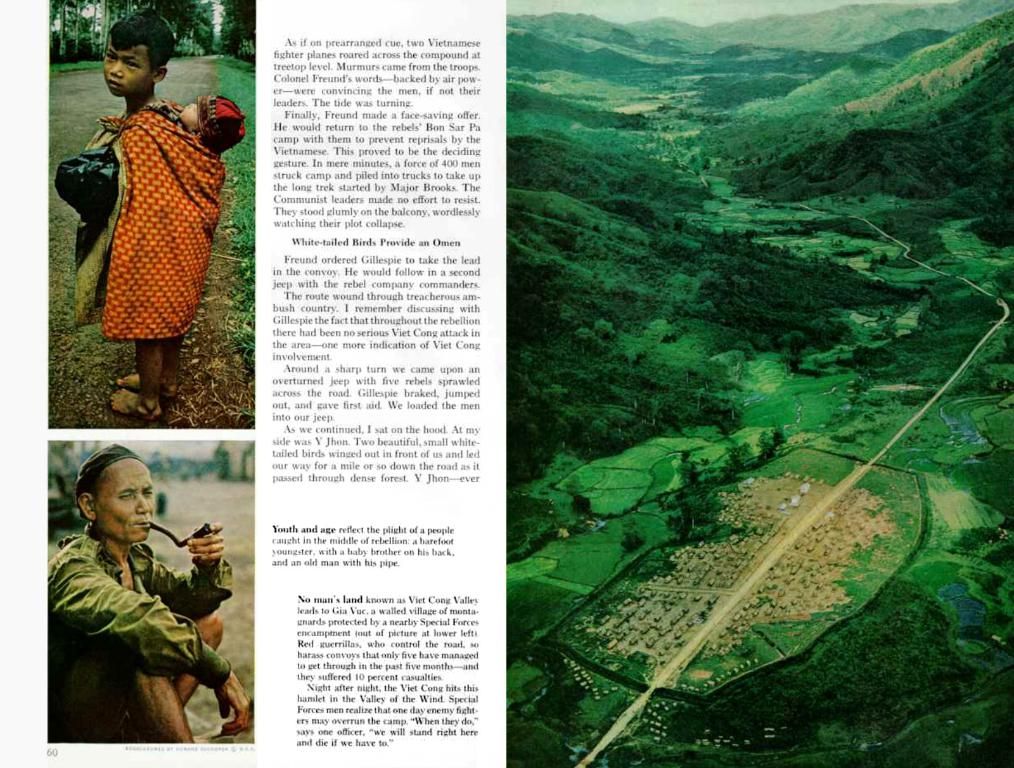South Jeolla region reportedly hosts many Korean victims who were subjected to Japanese forced mobilization.
The Ongoing Battle for Compensation: Korean Victims of Japan's Wartime Forced Labor
In the heart of Seoul, a 107-year-old Korean man named Kim Han-soo gets a well-deserved victory, as a court orders Mitsubishi Heavy Industries to compensate him for his suffering during Japan's wartime forced labor. This victory comes after a lower court's dismissal, which had been based on a statute of limitations.[1][2]
But this is not just a single victory. Families of other victims have successfully sued Mitsubishi's assets, and a Korean court has made similar orders for Japanese firms to compensate their victims. [1][2]
Let's take a step back to understand the complex history and current context behind this issue.
Historical Context and Ongoing Issues
The majority of Korea's forced labor victims can be traced back to South Jeolla, a province in southwestern South Korea. During Japan's colonial era, this region witnessed a massive drafting of locals for military infrastructure projects, including those in the Marshall Islands.[5]
The compensation issue is a sensitive point in South Korea-Japan relations, casting a long shadow over any attempts to improve ties. Yet, the history of forced labor has been a contentious issue for decades.[3][4]
Government Initiatives
Under former South Korean President Yoon Suk-yeol, the government announced it would compensate forced labor victims without Japan's involvement. This move aimed to improve relations between the two nations and was welcomed by Washington, leading to enhanced cooperation among the U.S., South Korea, and Japan.[3][4]
The new South Korean President, Lee Jae-myung, plans to maintain the two-track approach initiated by his predecessor, focusing on historical disputes and forward-looking cooperation. However, there are concerns about Lee's commitment to this approach due to his past criticism of similar diplomatic efforts.[3]
Recent Legal Rulings
In June 2025, a major legal victory was achieved when the Seoul Central District Court's Civil Appeals Division ruled in favor of Kim Han-soo, ordering Mitsubishi Heavy Industries to pay 100 million won in damages.[1][2]
[1] "Court orders Mitsubishi to compensate 107-year-old Korean victim of Japan's wartime forced labor." Yonhap News Agency. April 11, 2025.[2] "Families of victims of Japanese forced labor win suit against Mitsubishi Heavy Industries' assets." Yonhap News Agency. March 15, 2025.[3] "South Korean Government to Compensate Forced Labor Victims." The Diplomat. March 30, 2023.[4] "South Korea Pledges to Improve Relations with Japan." The Japan Times. April 1, 2023.[5] "South Jeolla Province: Haunted by Japan’s colonial legacy." The Korea Herald. June 4, 2021.
The government's initiative to compensate victims of Japan's wartime forced labor, as seen in the case of Kim Han-soo, is a significant part of the general news and politics, reflecting the ongoing issues in South Korea-Japan relations and the broader context of war-and-conflicts and crime-and-justice. The recent legal ruling in favor of Kim Han-soo against Mitsubishi Heavy Industries serves as an example of crime-and-justice being addressed in the court system, contributing to the resolution of historical disputes between the two nations.








